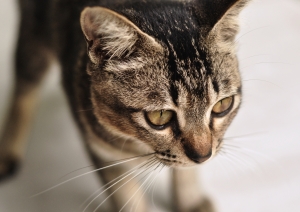 Keeping your cat healthy starts with knowing the diseases that felines are most susceptible to, and what you can do to prevent these illnesses. Dr. Karen Becker, DVM, released an article about the most common feline diseases and their causes. Three of the most common illnesses include dental disease, feline lower urinary tract disorder (FLUTD), and hyperthyroidism.
Keeping your cat healthy starts with knowing the diseases that felines are most susceptible to, and what you can do to prevent these illnesses. Dr. Karen Becker, DVM, released an article about the most common feline diseases and their causes. Three of the most common illnesses include dental disease, feline lower urinary tract disorder (FLUTD), and hyperthyroidism.
Preventing Dental Disease in Felines
As a pet owner, it’s important that you brush your cat’s teeth every day just like you brush your own teeth. This will prevent inflammation of the gums, which can ultimately lead to infections that can spread to other parts of the body. Plus, it will prevent your cat’s teeth from becoming loose and falling out.
Feeding an appropriate diet can help, but brushing your cat’s teeth with a feline-appropriate enzymatic toothpaste is necessary too. Provide treats that are designed to clean the teeth and gums, and be sure to bring your cat to the vet annually for a full exam of the mouth. Your vet will also be able to provide cleanings whenever necessary.
Causes and Prevention of FLUTD
When Veterinary Pet Insurance released its list of the most common feline health ailments of 2012, they listed FLUTD as the number one reason that cat owners had to bring their beloved pets to the vet. More than 4,000 of these claims were received throughout the year, and hundreds of dollars were spent on each visit to get these cats healthy again. But although this is a common problem, it’s entirely preventable simply by following the right nutritional guidelines.
Cats in the wild consume the meat of their prey, which is very high in moisture. But many household cats have to survive on the dry food that their owners provide. While dry food is convenient, and your kitty seems to be addicted to the flavor, kibble is detrimental to the overall health of your cat because it only contains about 5-10% moisture. Because cats’ bodies are designed to get their moisture directly from their food, they don’t drink water unless they start feeling really dehydrated. Cats who eat only kibble are in a constant state of mild dehydration. As a result, the kidneys and bladder begin to have difficulty functioning, leading to infections. Kibble also often contains grains that alkalize the urine, leading to crystal formation that can cause fatal blockages.
The Causes Behind Hyperthyroidism
Hyperthyroidism is more common in cats over 8 years of age, but taking steps throughout your pet’s life can prevent it. There are several conventional treatments available to combat the problem, but this is a chronic condition once it sets in, so it’s really best to try to avoid it in the first place.
Because hyperthyroidism translates to an overactive thyroid, which is stimulated by iodine, you want to avoid giving your cat any more iodine than he really needs. Seafood is high in iodine, so many vets advise against feeding fish to your cats. After all, cats in the wild aren’t fishing for tuna or salmon.
Understanding the major feline diseases that commonly strike domesticated cats and what you can do to prevent them is the key to ensuring your kitty will live a long, healthy, and happy life with you.





